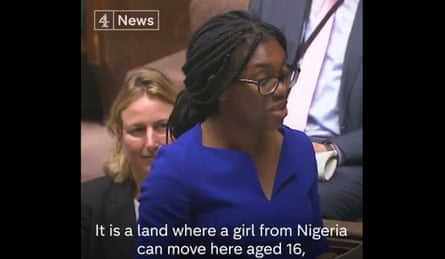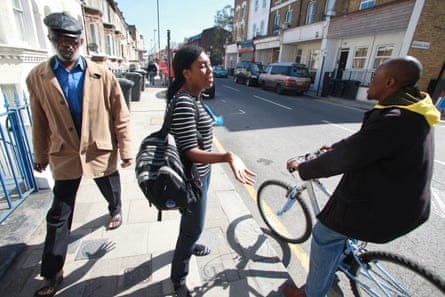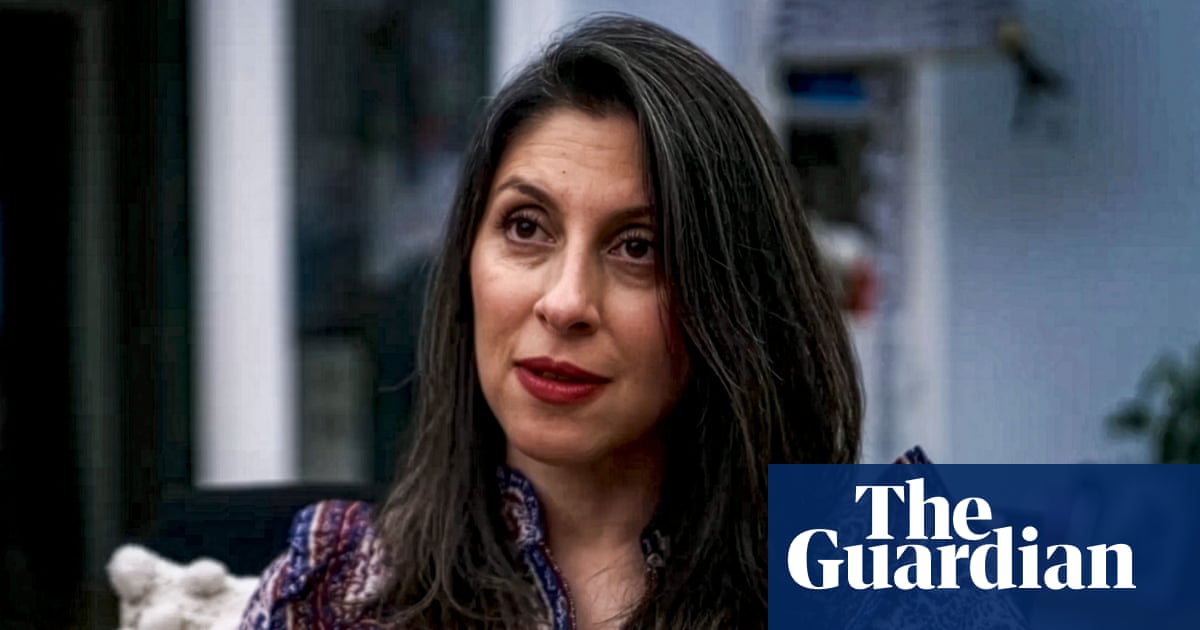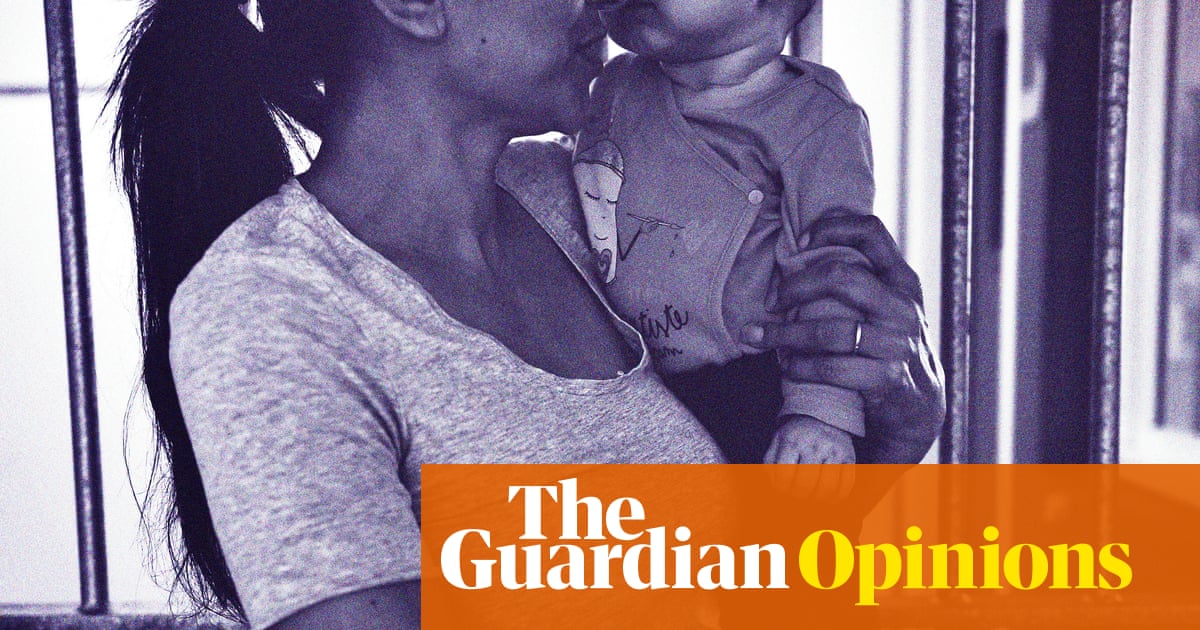The day before Kemi Badenoch promised Trump-style mass deportations during her Tory conference speech, she defended Conservative MP Robert Jenrick over his complaints he hadn’t seen “another white face’ in a Birmingham neighbourhood.
As the Tories shift further right, Badenoch has become aggressive about immigration, even denying her own Nigerian identity. This contrasts with her early days in politics, and her recent complaints of a creeping “ethno-nationalism” when she was labelled an “anchor baby”. As we approach the first anniversary of her troubled reign, I look at the two sides of Kemi.
Adegoke v Badenoch

Kemi Adegoke needed help. In 2005, stuck in a tough race to be elected the MP for London’s Dulwich and West Norwood, the 25-year-old computer engineer, reached out to her community for support. She appealed to their sense of family and community, urged them to push aside ethnic differences and smothered them with compliments. Her use of “we” was clear and generous.
“I need your help,” Adegoke wrote in her campaign leaflet. “There are about 20 days to go before polling day, and Nigerians have been fantastic. We need to get out of this mindset where we are fighting one another and try and support each other instead,” she urged the Nigerian community, pushing them to join her mailing list. “Regardless of party allegiance, a Nigerian in parliament winning purely on merit and not because of her relatives or by buying the election will be amazing.”
Kemi Badenoch, however, now the 45-year-old leader of the Conservative party and MP for North West Essex, does not see herself as Nigerian. “I don’t identify with it,” Badenoch said in a recent interview. Particularly interesting is that, Badenoch – who lived in Nigeria until she was 16 – claimed that even as a child, she “never quite felt like she belonged” there.
Since entering parliament in 2017, Badenoch has shown a disdain for Nigeria. She has used the country as the antagonist in a rags-to-riches story where her main character escapes a brutal socialist state, with nothing more than her father’s last £100 and a copy of Enid Blyton’s The Famous Five in her pocket.
Recently, her origin story has taken on a more aggressive form: an attempt to rid herself of any connection to Nigeria that could make anyone, tempted to vote for Nigel Farage, question her allegiance to Britain. “I find it interesting that everybody defines me as being Nigerian,” Badenoch told the Spectator. “I have nothing in common with the people from the north of the country … those were our ethnic enemies, and yet you end up being lumped in with those people.”
Kemi Badenoch would have found Kemi Adegoke very interesting. Adegoke proudly lumped herself in with “those people” and actively advocated that other Nigerians do the same. She didn’t name the group she created to gather support for her 2010 campaign Yorubas for Kemi or Southern Nigerians for Kemi. It was simply: Nigerians for Kemi. That same 2010 campaign promised to improve the national image of all Nigerians while fully supporting the “next generation of Nigerians trying to change things for the better”. Adegoke fully attached herself not only to addressing the challenges faced by the Nigerian diaspora but also demonstrated a personal investment in the country’s future. It’s not surprising she would feel that way. A few years earlier, what she termed a “quarter-life crisis” left her feeling disillusioned with a Britain that did not match the imaginary state she read about growing up in the very real Nigeria. Adegoke considered moving back to Lagos.
A new family

Seven years after Kemi Adegoke finished third in the race for that Dulwich and West Norwood seat, Kemi Badenoch was elected as the MP for Saffron Walden (now North West Essex). Since that elevation, Badenoch has not only formulated that distance from her Nigerianess, but she has discouraged any attempts to see her political rise as a win for the wider Black community. Badenoch has gone out of her way to downplay the history of racism in the UK, labelling Britain as “the best place in the world to be black.” She has dismissed critical race theory, the lingering effects of colonialism, white privilege, and reparations, and accused the Black community of being too quick to see things through a racial lens.
Badenoch can boldly say what many conservatives must whisper. Her maiden speech in parliament, where she spoke of Britain freeing an “African girl” like her, was widely celebrated by Tories. Her message has served her well in the party. But, it seems, not well enough.
Open to a Nigerian comeback?
after newsletter promotion

In 2015, the children’s author Adrian Bott tweeted: “‘I never thought leopards would eat MY face,’ sobs woman who voted for the Leopards Eating People’s Faces Party.”
The Leopards have been circling Kemi Badenoch. November will mark the first anniversary of her accession and the point at which she can officially be deposed as leader. Tories are upset by polls that consistently place them a distant third. Her conference speech, however, full of red meat for the base, seems to have bought her time.
Still, in this anti-migrant climate, she has sceptics among an influential online right who have attacked the very identity she has worked so hard to cultivate. She has been accused of being an “anchor baby”, her Britishness has been questioned, her work ethic challenged, and assumptions are made about how she became Tory leader – familiar racist tropes.
In the summer, with her job at risk, Badenoch suddenly saw racism. “There’s a lot of ethno-nationalism creeping up, lots of stuff about my race and my ethnicity and the tropes around, ‘Well, she couldn’t possibly have done this all by herself,‘” she told the Sunday Times.
As her political fortunes have shifted, Badenoch has gone from claiming there was no racism in the UK to acknowledging the existence of bigotry, to now not seeing anything wrong with Jenrick’s need to encounter more white faces.
With an uncertain future, it’s hard to guess where she will pivot next. Look closely, though, and you might see she has left the door open for a Nigerian comeback. In the same Sunday Times interview, on her Nigerian identity, she said: “I feel British. That is my nationality.” But then she added: “I don’t see how, certainly in the job I do, I can be holding two things in my head.”
She may not have that job for much longer, so whichever of her nationalities she decides to hold in her mind in the future, I’m sure that, as young Kemi Adegoke promised in that 2010 leaflet, any use of her identity “will not be about personal gain”.

.png) 1 month ago
38
1 month ago
38

















































